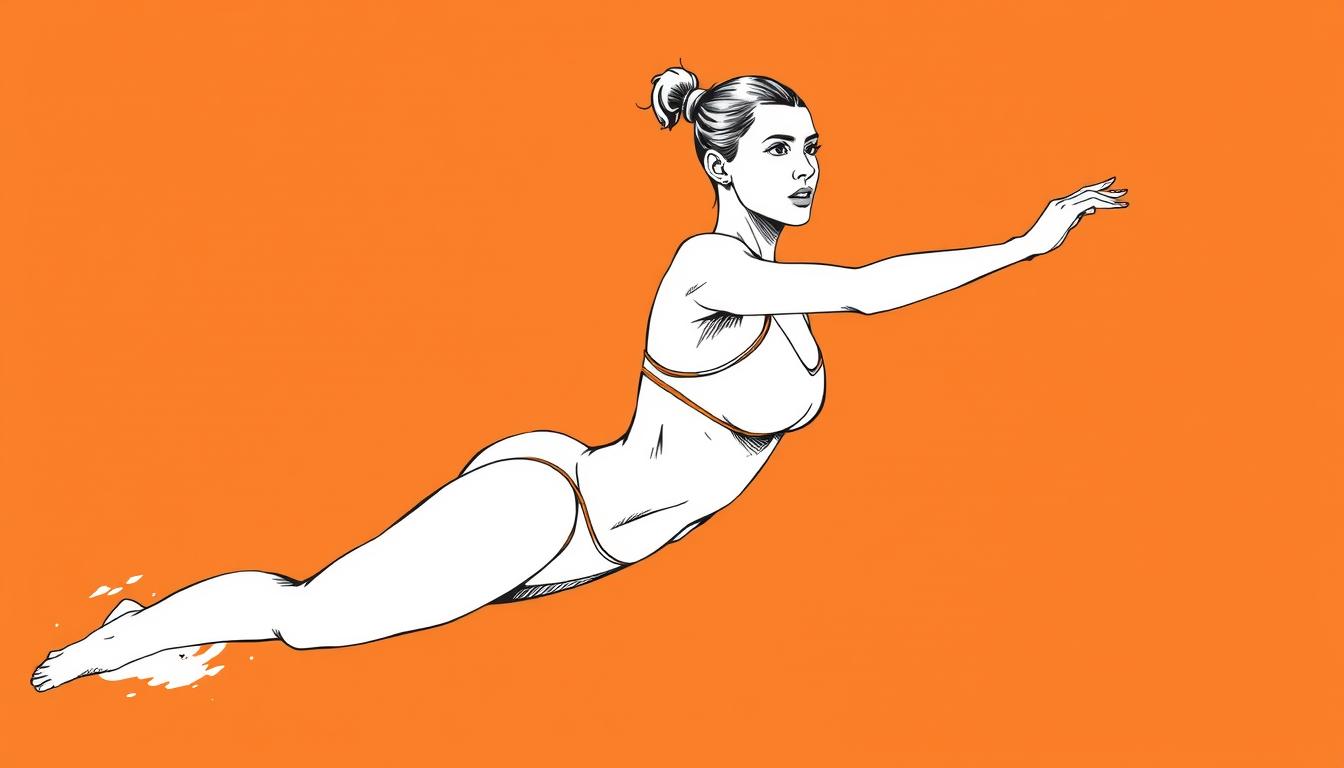The 2020 Tokyo Olympics delivered one of swimming’s most dramatic finishes. In the women’s 10 km open water race, Ana Marcela Cunha claimed gold by less than a second. That razor-thin margin captured the essence of marathon swimming.
Born in Salvador, Brazil in 1992, she turned distance and endurance into her personal language. The athlete speaks through currents, tides, and the relentless burn of marathon effort. Her specialty demands more than pure speed.
Open water swimming requires navigation, strategy, and the will to outlast competitors across kilometers of unpredictable water. Marcela Cunha mastered this demanding discipline like few others in history.
She built a career that rewrote the record books. The Brazilian star earned 17 World Championship medals, including seven gold. This tally places her among the sport’s most decorated names.
FINA honored her six times as the world’s best female open water swimmer. This recognition spanned a decade of dominance. Her achievements compare only to legendary multi-medalist Larisa Ilchenko.
This opening frames her not just as an athlete, but as a figure who transformed Brazilian swimming. She elevated open water racing on the global stage through sheer determination and skill.
Early Life and the Birth of a Champion
In the coastal city of Salvador, Bahia, where the Atlantic meets Brazilian shores, a future champion entered the world in March 1992. The name Marcela Jesus Soares da Cunha honored both maternal and paternal lineages in Brazilian tradition.
Family Inspirations and Early Sports Involvement
Athleticism ran deep in her family. Her father competed as a swimmer while her mother trained as a gymnast. Sport wasn’t just activity—it was family language.
She watched her parents move with discipline and joy. This combination planted something permanent. The family created space for training and competition from her earliest years.
| Year | Milestone | Location | Significance |
|---|---|---|---|
| 1992 | Birth | Salvador, Bahia | Entered world in coastal city |
| Early 1990s | First exposure to water | Local pools & beaches | Natural affinity developed |
| Childhood | Family athletic training | Home environment | Inherited discipline |
| Adolescence | Serious swim training | Salvador facilities | Foundation for career |
Introduction to Swimming and Open Water
Swimming came naturally to the young athlete. But open water became her true arena. Here, technique met unpredictability.
The swimmer found her edge in challenging conditions. Her family supported these ambitions fully. They understood the demands elite sport placed on adolescence.
This foundation shaped the champion she would become. It also informed her identity as an openly lesbian athlete adding dimension to her public role.
Starting Her Career: Breaking Barriers in Open Water Swimming
The 2006 South American Games revealed a prodigy who would redefine marathon swimming for a generation. At just 14 years old, Marcela Cunha dominated both the 5 km and 10 km events. Her double gold medal performance announced a serious contender.
This success followed a strong showing the previous year. In 2005, she placed second at Travessia dos Fortes, Brazil’s premier open water marathon. The race tests the nation’s top distance swimmers in challenging conditions.
Early Triumphs at the South American Games
Her victories in Buenos Aires were no beginner’s luck. The teenager demonstrated pacing and endurance beyond her years. She finished ahead of older, more experienced competitors.
Open water swimming demands different skills than pool racing. Athletes must read currents and manage fatigue without lane lines. Marcela Cunha adapted quickly to these challenges.
First International Competitions and Milestones
She returned to Travessia dos Fortes in 2006 as champion. The swimmer defended that title again in 2011. These wins proved her early success was a pattern, not a flash.
Her raw talent translated into tactical awareness. She developed the mental toughness required for marathon swim events. The young athlete showed she belonged at the front of any race.
These early competitions built her confidence on the international stage. They served as proof that she could compete with the world’s best open water swimmers.
Rise to Prominence in International Competition
At just 16 years old, a Brazilian teenager stepped onto the world’s biggest sporting stage. Her journey to the Olympics began with a tenth-place finish at the FINA World Open Water Swimming Championships in Seville. This performance secured her spot in Beijing’s inaugural women’s 10 km open water marathon.
Qualifying for the Olympics at a Young Age
Marcela Cunha became the youngest swimmer ever to compete in the new Olympic marathon swim event. She faced twenty-four elite competitors from around the world. The field included her Brazilian teammate Poliana Okimoto and international stars like Natalie du Toit.
The young water swimmer finished fifth with a time of 1:59:36.8. She edged out Switzerland’s Swann Oberson by just one second. Gold medalist Larisa Ilchenko finished nine seconds ahead in this historic race.
This fifth-place finish signaled her arrival as a world-class open water swimming talent. She proved she could handle Olympic pressure despite her youth.
Notable Performances in Major Championships
The following year brought a setback at the 2009 FINA World Championships in Rome. She placed twenty-second in the 10 km marathon swim. This result taught her about the volatility of open water competition.
She responded with dominant performances throughout 2010. The swimmer won all eight meets of the FINA 10 km Marathon Swimming World Cup circuit. This sweep demonstrated remarkable consistency and tactical growth.
FINA recognized her dominance by naming her the best female open water swimmer of 2010. This honor marked her evolution from promising talent to established world-class competitor.
Ana Marcela Cunha – A Legacy in Open Water Marathon
A collection of seventeen World Championship medals, seven of them gold, tells only part of the story. This open water swimmer built a legacy defined by relentless endurance and tactical brilliance. Her career rewrote the record books for Brazilian athletes on the global stage.
Record Medals and Historic Wins
The 25 km marathon became her signature event. She first claimed this world title in Shanghai 2011, proving her mastery over extreme distances. Victories in Kazan 2015 and Budapest 2017 followed, creating a streak of dominance.
By 2022, she secured her fifth world championship in the 25 km event. This included four consecutive titles. Such consistency in world open water swimming is rare.
Her versatility shone across other distances too. Gold medals in the 5 km event demonstrated her speed and adaptability. This complete skill set cemented her status as a true great.
| Year | Championship | Event | Result |
|---|---|---|---|
| 2011 | Shanghai | 25 km Marathon | Gold Medal |
| 2015 | Kazan | 25 km Marathon | Gold Medal |
| 2017 | Budapest | 25 km Marathon | Gold Medal |
| 2022 | Budapest | 25 km Marathon | Gold Medal |
Comparison with International Open Water Legends
Her medal count and longevity draw a direct comparison to Larisa Ilchenko. The Russian star also dominated world open water competitions for years. Both athletes set a standard for excellence in the sport.
This consistency across a decade of world class water swimming places them in a category of their own. Their achievements are benchmarks for future champions. The Brazilian’s career is a testament to what is possible with dedication.
Signature Performances and Olympic Drama
Redemption came in Tokyo’s waters after the disappointment of Rio. The contrast between these two Olympic marathon swim events defined the athlete’s career trajectory.
Highlights from the 2020 Tokyo Summer Olympics
The women’s 10 km open water swimming event delivered one of the closest finishes in Olympic history. Ana Marcela Cunha secured gold by just 0.7 seconds after nearly two hours of racing.
FINA recognized this dramatic victory as the seventh-best moment of the entire Tokyo Games. The marathon swim required perfect pacing and a final sprint that tested every competitor’s limits.
Memorable Races and Narrow Victories
Four years earlier in Rio, expectations weighed heavily on the Brazilian star. Competing at home brought immense pressure that affected her performance.
She finished tenth in the 2016 Olympic marathon, attributing the result to missed nutrition during the race. The Tokyo gold represented a complete turnaround in race execution and mental preparation.
| Aspect | 2016 Rio Olympics | 2020 Tokyo Olympics |
|---|---|---|
| Result | 10th Place | Gold Medal |
| Margin | Finished 1:24 behind winner | Won by 0.7 seconds |
| Conditions | Home country pressure | Neutral venue focus |
| Key Factor | Nutrition issues | Tactical execution |
The difference between these Olympic performances shows how marathon swimming combines physical endurance with mental strength. Victory in this open water event demands more than just swimming fast.
Training Regimen and Competitive Techniques
Behind every gold medal lies a daily grind of calculated preparation. For a champion open water swimmer, victory is built on aerobic endurance and mental toughness.
Training adapts to the unique demands of a marathon swim. It blends long pool sessions with open water practice in shifting conditions.
Specialized Training Strategies for Marathon Swimming
Her regimen targets the ability to maintain technique for hours. This requires more than just logging distance.
Key components of her training include:
- Long-distance pool work to build a powerful aerobic base.
- Strength conditioning to support the repetitive motion of distance swimming.
- Open water sessions to master navigation in unpredictable currents.
This approach prepares the athlete for anything the race day presents. It turns the open water into a familiar arena.
Race Tactics and Nutritional Approaches
Race strategy is as critical as physical conditioning. Pacing and positioning within the pack conserve energy for the final push.
Nutritional strategy learned from past experiences is vital. Proper in-race feeding prevents the power fade that can cost a race.
| Race Factor | Strategic Importance | Outcome When Mastered |
|---|---|---|
| Pacing | Conserves energy for final kilometers | Strong finishing sprint |
| Positioning | Reduces drag and maintains sightlines | Tactical advantage |
| Nutrition | Sustains power output over hours | Consistent performance |
This disciplined preparation fueled dominant World Cup circuit performances. It proves that consistency in open water swimming comes from meticulous daily work.
Impact on Brazilian and Global Open Water Swimming
Her influence on the sport extends far beyond the medal podium. She transformed open water swimming in Brazil from a niche pursuit into a celebrated national achievement. This shift inspired a new wave of athletes to enter the discipline.
Young swimmers now see a viable path to world open water success. Her career demonstrated that Brazilian athletes could dominate on every stage.
Influence on Future Generations of Swimmers
Major victories outside the Olympic cycle cemented her status. She claimed gold at the 2019 Pan American Games in the 10 km marathon. That same year, she won the 5 km event at the ANOC World Beach Games.
These wins showcased her versatility to a global audience. A gold medal at the 2018 Pan Pacific Championships further expanded her reach.
Her visibility as an openly lesbian athlete also broadened representation. She became a powerful role model for LGBTQ+ youth in sports worldwide.
| Competition | Year | Event | Result |
|---|---|---|---|
| Pan American Games | 2019 | 10 km Marathon | Gold Medal |
| ANOC World Beach Games | 2019 | 5 km Open Water | Gold Medal |
| Pan Pacific Championships | 2018 | 10 km Open Water | Gold Medal |
| Pan American Games | 2023 | 10 km Marathon | Gold Medal |
This consistent dominance across different competitions raised the profile of women’s open water swimming. Her legacy is a generation of swimmers empowered to dream bigger.
Awards, Honors, and Records Along the Journey
The formal honors accumulated alongside the medals, creating a timeline of dominance that few athletes achieve. These recognitions from the world swimming association validate what the results already showed.
Recognitions from FINA and National Bodies
FINA named her Female World Open Water Swimmer of the Year six times between 2010 and 2019. This honor from the global water swimming association reflects sustained excellence across different competitive cycles.
The first award in 2010 followed a perfect sweep of the World Cup circuit. Back-to-back honors in 2014 and 2015 cemented her status as the world’s premier open water swimmer.
Brazil’s Olympic Committee also recognized her achievements with national awards. These honors celebrated her impact beyond just world open water competitions.
Historical Achievements and Winning Streaks
Her Tokyo Olympic marathon gold earned a special place in FINA’s top moments of the Games. That dramatic victory showcased the pinnacle of open water swimming success.
The athlete holds the record for most World Championship medals by any Brazilian woman across all Olympic sports. This distinction transcends swimming and speaks to her historical significance.
Three consecutive 25 km world titles from 2017-2019 demonstrated remarkable consistency. Such winning streaks in world open competition are rare in any endurance sport.
Personal Life, Identity, and Cultural Influence
Her public role extends far beyond athletic achievement to include representation and advocacy. The swimmer’s identity as an openly gay woman from Brazil’s Northeast region adds depth to her champion status.
Family Background and Early Influences
Marcela Jesus Soares da Cunha comes from a family deeply rooted in sports. Her father competed as a swimmer while her mother trained as a gymnast.
This athletic environment provided natural advantages. It also created a home where discipline and training were normalized from childhood.
The name Jesus Soares Cunha follows Portuguese naming traditions. Jesus Soares represents her maternal lineage while Cunha comes from her father’s side.
Her Role as a Representation of Diversity in Sports
In a 2021 interview, she described herself as “a woman, from the Northeast, and a lesbian.” This frank acknowledgment matters in Brazilian sports where LGBTQ+ athletes face barriers.
Her visibility challenges traditional images of elite athletes. She expands what Brazilian sports representation can look like.
Young women from underrepresented regions now see new possibilities. Her success proves that background doesn’t limit potential in open water swimming.
| Aspect of Identity | Personal Significance | Broader Impact |
|---|---|---|
| Northeastern Brazilian | Regional pride and connection | Expands geographic representation in sports |
| Openly Lesbian | Personal authenticity | LGBTQ+ visibility in athletics |
| Family Athletic Legacy | Early exposure to sports | Shows value of supportive environments |
| World Champion Status | Professional achievement | Redefines who can be an elite athlete |
Her advocacy work continues to influence conversations about diversity. The champion uses her platform to create space for more women in sports.
Final Reflections on a Living Legend
Her career defies the typical arc of an open water swimmer. Most athletes peak for a brief window, but she remains a dominant force. Recent victories at the 2022 World Aquatics Championships prove her lasting power.
She captured her second straight gold in the 5 km event and added a bronze in the 10 km marathon swim. That same year, she secured an incredible fifth world title in the grueling 25 km race. This marks four consecutive wins in that ultimate test of endurance.
This longevity sets a new standard for what is possible in world open water swimming. Her success across different distances showcases rare tactical intelligence and physical resilience.
She has inspired a generation of swimmers in Brazil and beyond. Her legacy is one of relentless dedication. It redefines the potential for athletes in the demanding Olympic marathon swim discipline.




